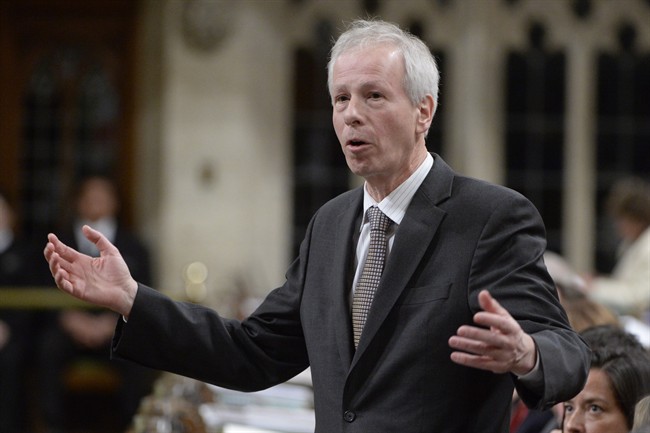A December meeting between Foreign Affairs Minister Stephane Dion and his Saudi counterpart Adel Al-Jubeir was held at the request of the Saudis, briefing documents show.

The documents were obtained through an access to information request by York University PhD student Anthony Fenton and provided to Global News.
The briefing notes go over talking points and key messages for Dion in the meeting, held in Ottawa on December 17. One is to highlight the key “trade and security” relationship between Canada and Saudi Arabia.
“I am impressed by the size of our trade relationship, and that it covers so many sectors,” Dion is advised to say. “You are our most important trading partner in the Middle East and North Africa (MENA) region.”
The talking points then move on to Canada’s controversial $15-billion arms deal with Saudi Arabia, but only mentions the contract before redacting information related to it.
The deal to sell the Saudis light-armoured vehicles was struck under the former Tory government in 2014.
But ever since the mass execution of 47 people in Saudi Arabia in a single day last January (many of whom the state accused of terrorism), Liberals have faced increased pressure to explain why they won’t cancel the deal.
READ MORE: Analysis: The changing nature of why the Liberals stand behind Saudi arms deal
The documents show Dion was advised to bring up human rights issues with Al-Jubeir.
“You should seek the Minister’s views on the human rights situation in his country and where he views the main areas for possible change,” the briefing notes read. “You may want to offer congratulations for the Kingdom’s December 12 municipal elections when women ran as candidates and voted for the first time.”
More advice to Dion on what to say to Al-Jubeir follows.
“I hope that this is the beginning of an ongoing, frank and respectful dialogue with you on human rights issues,” the documents read.
Much of the information and talking points provided to Dion on human rights is redacted.
The briefing notes also mention the case of Raif Badawi, a blogger whose family lives in Canada.
READ MORE: Trudeau not ready to intervene in case of jailed Saudi blogger
Badawi was sentenced to 10 years in jail as well and 1,000 lashes. He was arrested in 2014 for his criticism of Saudi clerics.
He received the first 50 in January 2015 during a public flogging.
At the time of his meeting with Al-Jubeir, Dion said he raised the Badawi case.
“I expressed the government’s hope that clemency will be granted in this case,” Dion said in a statement.
Other than mentioning the case, all other information about Badawi in the briefing notes is redacted.
A number of reasons for redacting information in the documents are provided in a general sense.
The reasons include:
- the head of a government institution shall refuse to disclose any record requested under this Act that contains personal information as defined in section 3 of the Privacy Act
- the head of a government institution may refuse to disclose any record requested under this Act that contains trade secrets or financial, commercial, scientific or technical information that belongs to the Government of Canada or a government institution and has substantial value or is reasonably likely to have substantial value
- the head of a government institution may refuse to disclose any record requested under this Act that contains information the disclosure of which could reasonably be expected to prejudice the competitive position of a government institution or to interfere with contractual or other negotiations of a government institution
- the head of a government institution may refuse to disclose any record requested under this Act that contains advice or recommendations developed by or for a government institution or a minister of the Crown
Read the documents here:




Comments